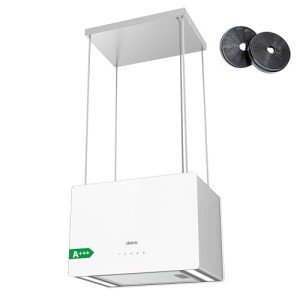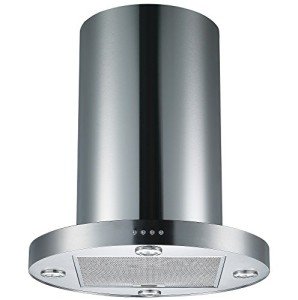The People Closest To Cooker Hood For Island Share Some Big Secrets
페이지 정보

본문

Cooker Hood for Island: Essential Guide to Choosing and Installing the Right Model
In modern cooking areas, the island hood has actually emerged as a vital home appliance for homeowners aiming to integrate performance with style. Not only does it improve air quality by expelling smoke, odors, and grease, however it likewise serves as a design centerpiece. This post explores the importance of island hoods, the factors to consider when selecting one, the different types offered, and island Range hood with convertible venting options setup pointers.

Comprehending Island Hoods
Island hoods are ventilation systems that hang above kitchen islands, usually where cooktops are set up. Unlike standard range hoods for islands hoods, which connect to walls, island hoods are often in the center of the kitchen, requiring thoughtful factor to consider of style and effectiveness.
Why Choose an Island Hood?
- Visual Appeal: An island hood can boost the overall look of your kitchen, typically available in different styles and finishes to complement your decoration.
- Improved Air Quality: By effectively getting rid of smoke, steam, and odors, island hoods assist maintain a fresh environment in the kitchen.
- Improved Lighting: Many island hoods come geared up with integrated lights, providing additional illumination for cooking jobs.
Aspects to Consider When Choosing an Island Hood
Picking the right island hood involves thinking about several vital factors. Here's a consolidated overview:
1. Size and Dimensions
- Hood Width: The hood needs to cover a minimum of the width of the cooktop. For optimum performance, a basic general rule is that it must extend 3 inches on each side.
2. Type of Ventilation
- Ducted: This type vents air outside, offering optimal efficiency. It's perfect for larger kitchen areas and those that prepare often.
- Ductless: Ductless hoods recirculate air through filters. These are easier to set up but might not be as reliable in larger spaces.
3. Air flow Capacity
- CFM (Cubic Feet per Minute): This measurement shows how much air the hood can move. A higher CFM is better for heavy cooking, while lower CFMs suffice for light usage. A general suggestion is:
- Light Cooking: 200-400 CFM
- Medium Cooking: 400-600 CFM
- Heavy Cooking: 600+ CFM
4. Style and Design
- Consider various finishes and designs:
- Chimney Style: Features a wall-mounted chimney that suspends.
- Canopy Style: A more compact choice, often installed straight over the cooktop.
- Downdraft: Integrated into the cooktop, rising just when needed.
5. Noise Level
- Sone Rating: This suggests the noise released by the hood. A sone ranking of 1-2 is considered quiet, while anything above 4 may be intrusive.
6. Features and Controls
- Lighting Options: Look for LED lighting for energy effectiveness.
- Speed Settings: Multiple extractor fan for island speeds can provide more control depending on the cooking scenario.
- Filter Type: Select between mesh, baffle, or triggered charcoal filters based on upkeep and cooking design.
Setup Tips
Setting up an island hood can be a tough task. Here are some essential actions for a successful setup:
Choose the Right Height: Ideally, place the hood 30-36 inches above the cooktop for ideal performance and safety.
Surface Preparation: Ensure that the ceiling is structurally sound to support the weight of the hood.
Electrical and Ductwork: If choosing a ducted design, plan for ductwork to be gone to the exterior. Consult with a professional if required.
Follow Instructions: Always follow the manufacturer's installation guidelines for best practices.
Test the System: Once installed, evaluate the ventilation and lighting functions before finishing any final touches.
Selecting and setting up a cooker hood for an island cooker hoods 60cm is a valuable investment in both the functionality and visual appeals of a kitchen. By thinking about factors like size, ventilation type, airflow capacity, style, setup guidelines, and easy to use features, homeowners can enhance their cooking environments while making sure much healthier air quality.
Frequently Asked Questions (FAQs)
Q1: How do I know what size island hood I need?A: Measure the width of your cooktop and pick a hood that is at least as large, ideally extending a couple of inches on each side. Q2: Are ductless hoods simply as effective as ducted
ones?A: Ductless hoods are simpler to set up and need less upkeep however might not carry out as efficiently as ducted hoods for heavy cooking requirements. Q3: How frequently need to I clean up the filters?A: It's advised to tidy or Island range hood With Convertible venting options replace filters every 1-3 months, depending on use. Q4: Can I install the island hood myself?A: While some homeowners may choose to set up the hood themselves, employing a professional is advisable, specifically for ducted designs. Quick Reference Table
: Island Hood Selection Guide Aspect Recommendation Hood Width A minimum of equivalent to cooktop; extends 3 inches on each side Airflow (CFM )Light Cooking
: 200-400 CFM; Medium: 400-600; Heavy: 600+Noise Level Goal for 1-2 soneratingfor quiet performanceFilter TypeBaffle or mesh for easier maintenance; activated charcoal for ductless Installation Height 30-36 inches above the cooktop Incorporating an island range hood with convertible venting options hood into a kitchen setup isnot simply a matterof function; it is likewise a consideration of style, ease of use, andair quality.This cautious selection improves cooking experiences while raising the generalkitchen visual.
- 이전글Why ADHD Diagnosis Is Fast Becoming The Hot Trend For 2023? 25.05.21
- 다음글10 Mistaken Answers To Common Dual Fuel Range Cookers Questions Do You Know The Right Answers? 25.05.21
댓글목록
등록된 댓글이 없습니다.




